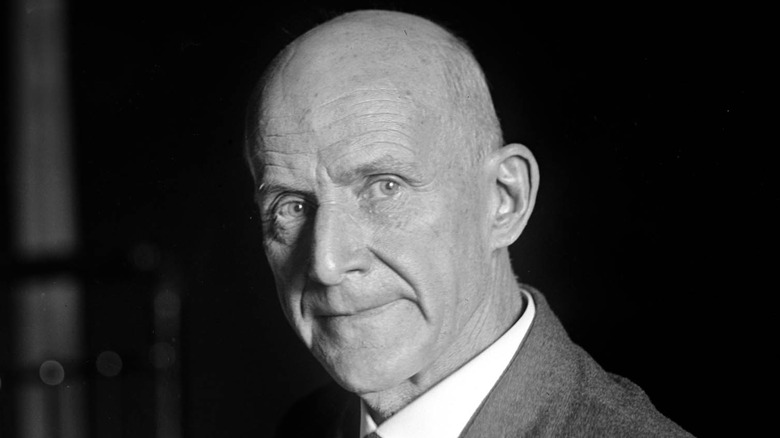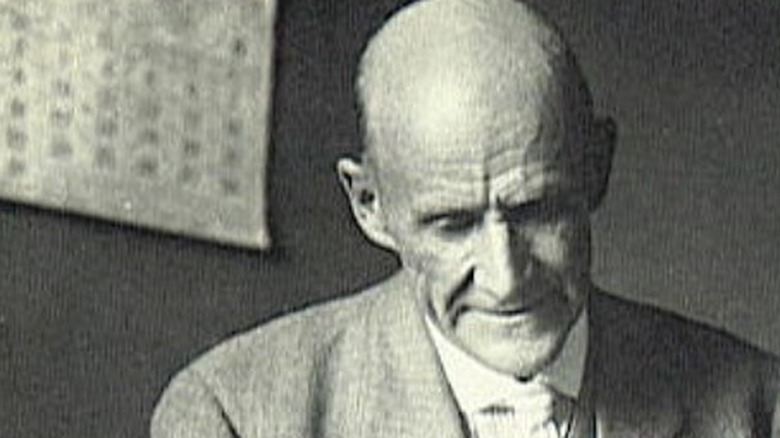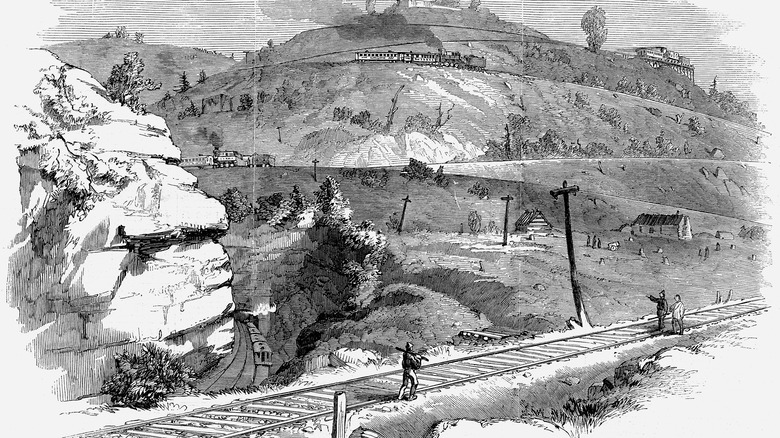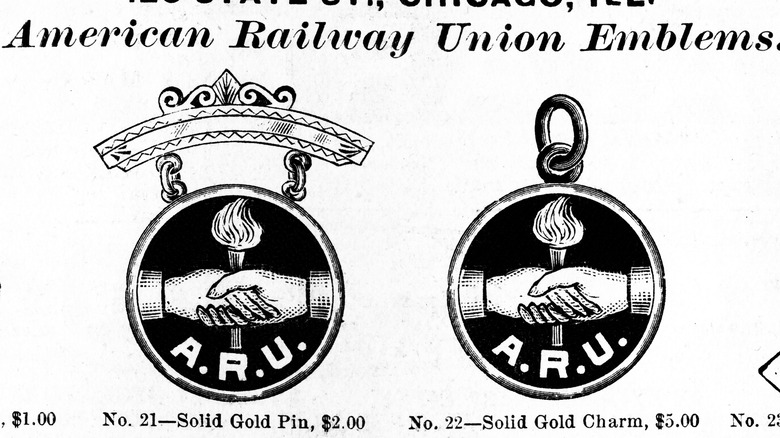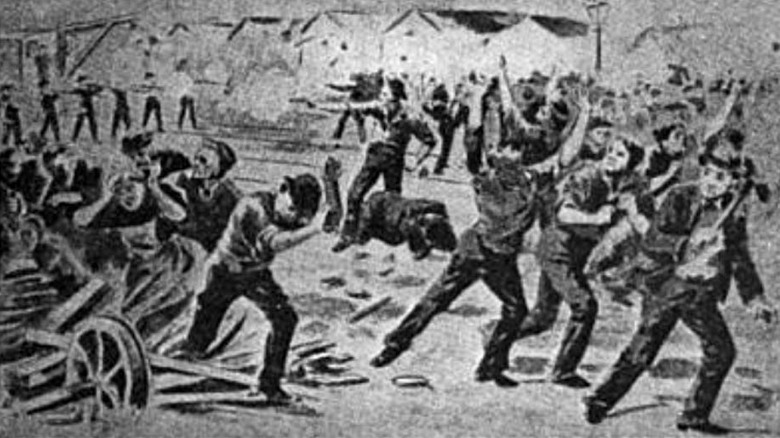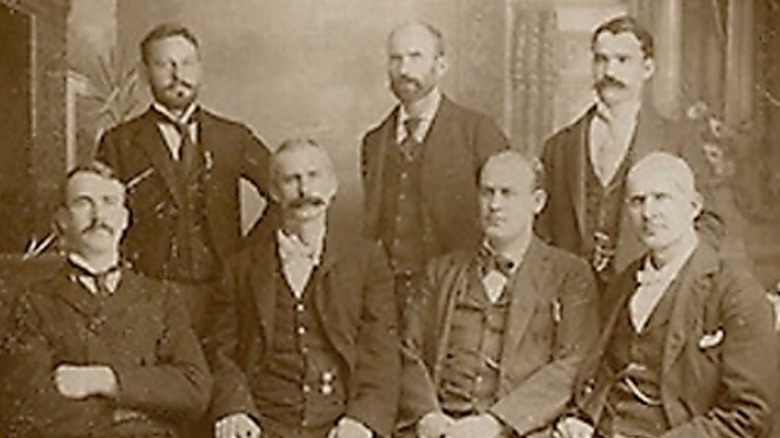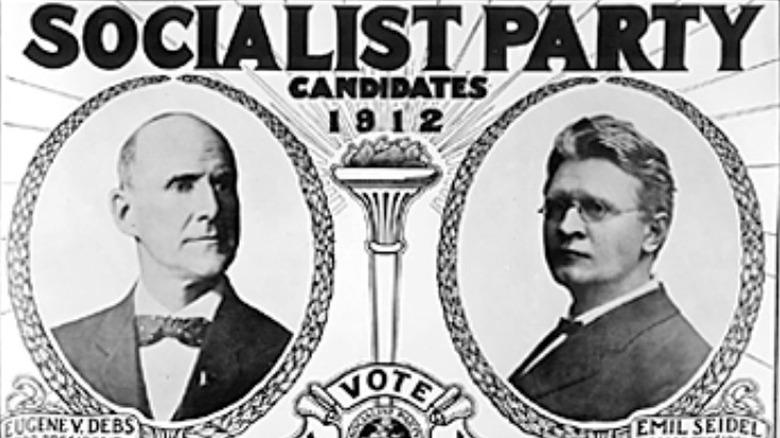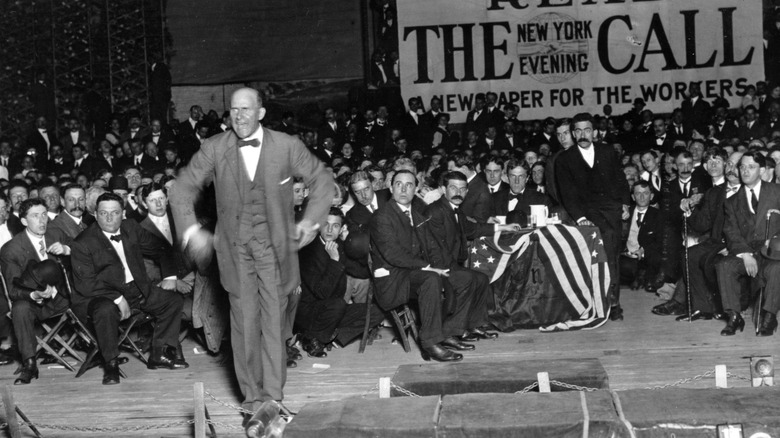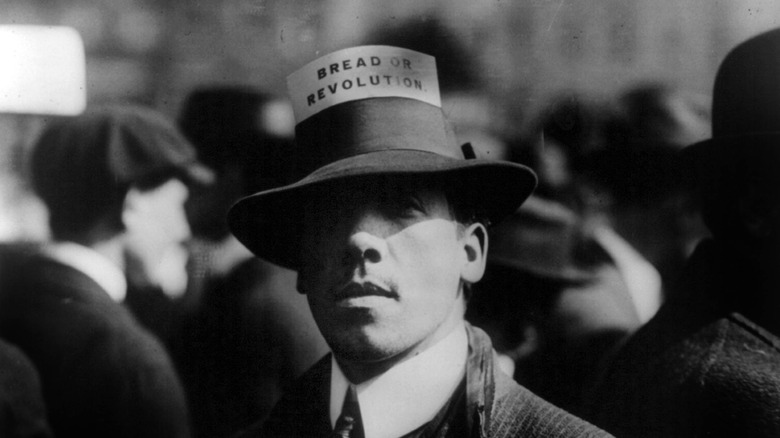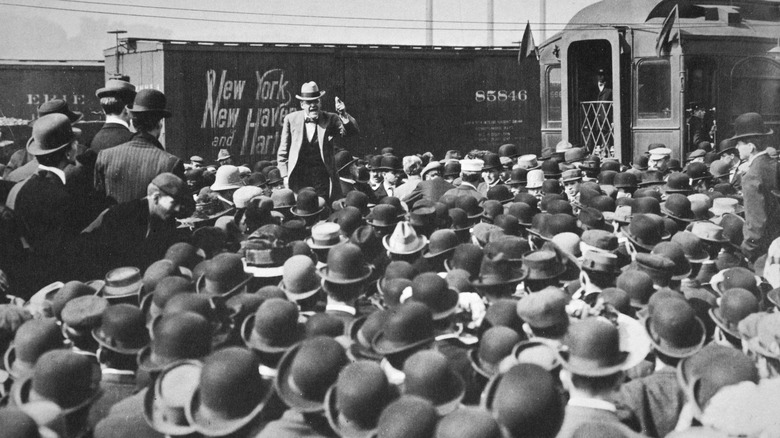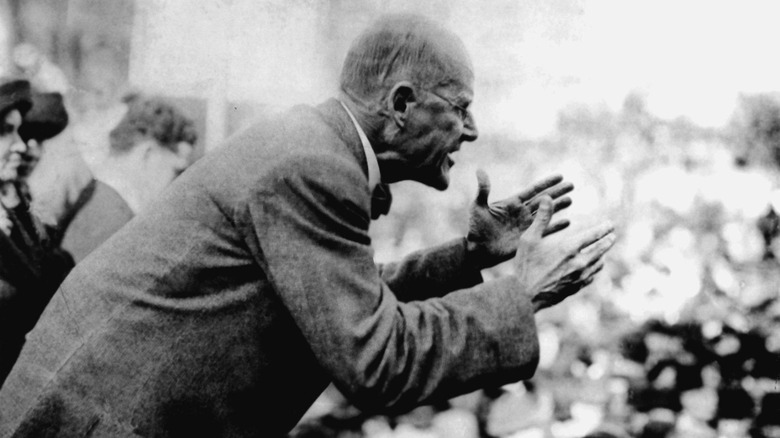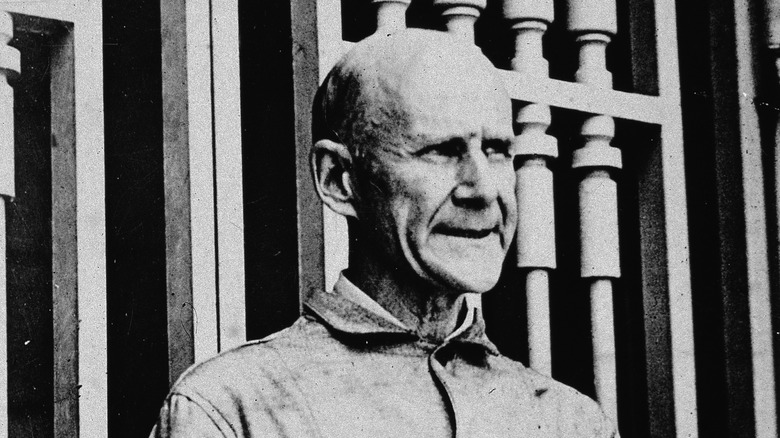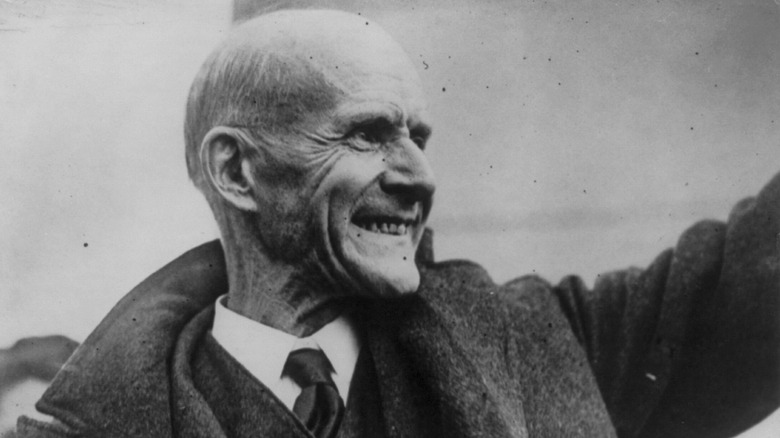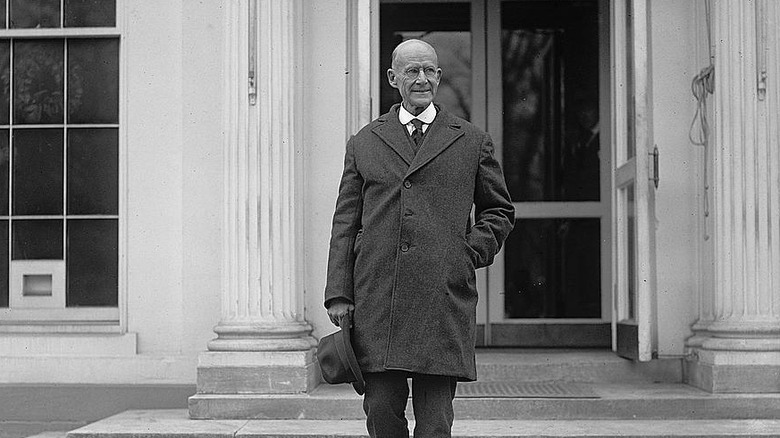The Untold Truth Of Eugene V. Debs
Eugene V. Debs was one of the most popular figures of the American labor movement. And while he didn't start his political life as a socialist, he ended up there, largely due to his first stint in prison. During a second stint in prison, he became the first person to run for president while in prison.
Known for his role in the Industrial Workers of the World, as well as in the Socialist Party of America, Debs has been heralded as "probably the most effective and popular leader that the American working class has ever had," as Bernie Sanders described him in 1979. Whether or not Debs was effective is still up for debate among historians, but his popularity while active is undeniable.
And while being unwaveringly against reform and advocating for a total abolition of the capitalist system, Debs spent his life expanding his thinking. He was not only radical, but willing to change his mind as he learned and grew.
When Debs died in 1926, Time described him as "a broken prophet." But Debs was neither a prophet, nor was he broken. Many of the ideas he spent his life advocating for were by then absorbed into the mainstream. Although the abolition of the capitalist system didn't come to pass, Debs was one of the first to show that there were many among the American public willing to fight for such a goal. This is the untold truth of Eugene V. Debs.
Eugene V. Debs' early life
Eugene Victor Debs was born in Terre Haute, Indiana on November 5, 1855. His parents, Jean Daniel and Marguerite Mari Bettrich Debs, were both immigrants from Alsace, France, and they operated a small grocery store. New Socialist Magazine reports that Debs was named after French novelists Eugene Sue and Victor Hugo, and he was one of six siblings.
According to Finding Dulcinea, although Debs' parents arrived in the United States with little money, while Debs was young they were able to save up enough to open the store. With this, Debs was able to enjoy "a middle-class life of hunting and fishing," and briefly attend a private school before going to a public school.
When Debs was 14, he dropped out of school and started working at the Vandalia Railroad. Paid 50 cents per day, his job was scraping grease and paint off of the train cars. Within a year, he was promoted to fireman, and given the task of shovelling coal into the fireboxes. According to the Debs Foundation, he also attended night classes at a local business school.
But, according to the New Yorker, Debs lost his job during the Panic of 1873. This led him to move to East St. Louis as he looked for work, but within two years, Debs returned to Terre Haute.
Getting into organizing
Back in Terre Haute, Eugene V. Debs joined the Brotherhood of Locomotive Firemen and helped create the Terre Haute local chapter in 1875. According to "Eugene V. Debs: an American paradox," he not only served as a recording secretary and an organizer for the union, but he was also soon elected associate editor for the union's magazine, Firemen's Magazine. By 1880, Debs was made editor-in-chief. That year, he was also made national secretary-treasurer of the union.
Finding Dulcinea reports that Debs also dipped his toes into public politics. In 1879, starting out as a Democrat, Debs was elected city clerk in Terre Haute, where he served two terms, and in 1885, he was elected to the Indiana state legislature.
However, after serving one term on the state legislature, Debs realized that there was little he could do from his position to improve the lives of railroad workers. According to New Socialist Magazine, Debs later remarked "When I rise it will be with the ranks, not from the ranks." Debs wasn't proud of the time that he spent as part of the Democratic Party, later claiming "I am as much ashamed of that as I am proud of having gone to jail," per the New Yorker.
After being involved in the Burlington Railroad Strike of 1888, where workers were defeated, Debs started to envision a more unified front for railroad workers.
Founding the American Railway Union
Debs worked as part of the Brotherhood of Locomotive Firemen from 1880 to 1893. But in response to the "limited craft organization of the Brotherhood," where brotherhoods were separated based on the work that was being done, such as fireman or switchmen, Debs left the organization and founded the American Railway Union (ARU) in Chicago in 1893, according to the Debs Foundation. Debs believed that this organization would allow all railroad workers to be united, making it more difficult for railway owners to break strikes by simply hiring replacement workers.
According to the New Yorker, Debs initially tried to get the Brotherhood to expand to an industrial union, but Samuel Gompers, labor union leader of the American Federation of Labor, wanted the men to join his union instead, which was "far less radical." But Debs persevered, and after the American Railway Union won its first victory with the strike of the Great Northern Railroad in April 1894, membership exploded. The Illinois Labor History Society writes that workers were joining the American Railway Union at a rate of almost 2,000 new members per day and before long, the American Railway Union had almost 150,000 members.
The Pullman Strike
In May 1894, Pullman Car Company workers organized a strike against the company. Aafter hearing Jennie Curtis, a leader of the seamstress workers for the Pullman car shops, give a rousing speech, the ARU voted to support the Pullman workers in their strike and decided to refuse to work "any trains that included Pullman cars," according to Illinois Labor History Society.
Eugene V. Debs originally didn't want the ARU to get involved because these were sleeping car workers rather than railroad workers, according to the Debs Foundation, ironically drawing the same lines of separation that he'd once rejected. But, the New Yorker reports, members of the union "found the Pullman workers' plight impossible to ignore" and voted to join them with a boycott.
With the ARU behind them, the Pullman Strike was able to bring train traffic in several states to a standstill for over three months. According to ThoughtCo, by July, the strike spread across the nation and "almost all train traffic to states west of Detroit had been stopped because of the boycott."
By this point, the federal government got involved on the grounds the mail wasn't being delivered, and President Grover Cleveland got a court injunction against the strike. After workers ignored the injunction, the U.S. Army was sent in and broke the strike.
Up to 30 workers were killed during the strike, thousands were blacklisted, and Debs was imprisoned for six months along with other ARU officers.
Going to jail
Eugene V. Debs and other officers of the ARU were convicted of violating the federal injunction and the U.S. Supreme Court upheld the convictions. According to the New Yorker, Debs was sentenced to six months while the others were sentenced to three. This was likely because Debs was the president of the ARU, even though he wasn't enthusiastic about the boycott and the strike from the beginning.
While Debs was imprisoned in the jail in Woodstock, Illinois he began learning more about socialism from pamphlets and books that socialists sent him in the mail. In his piece "How I Became a Socialist," Debs writes that he "began to read and think and dissect the anatomy of the system in which workingmen, however organized, could be shattered and battered and splintered at a single stroke." In jail, Debs also met Victor L. Berger, who brought him a copy of "Das Kapital" by Karl Marx.
With so many of its members blacklisted, the ARU failed to recover after the Pullman Strike. But Debs would later write that it was "defeated but not conquered —overwhelmed but not destroyed."
Founding the Socialist Party of America
The New Yorker reports that when Eugene V. Debs was released from jail, he was met by a crowd of over 100,000 people, and that he spoke to them about using their vote to overturn the capitalistic government. With this in mind, Debs stepped back into the political fray.
Although Debs endorsed William Jennings Bryan during the race against William McKinley, after seeing how businessmen used their money to get McKinley elected, Debs "abandon[ed] his devotion to the two-party system."
Debs founded the Social Democracy in America out of the Brotherhood of the Cooperative Commonwealth and what remained of the American Railway Union. But by their second convention, the organization dissolved and became instead the Social Democratic Party of America.
Kansas Heritage writes that Debs became the treasurer of the newly founded party, and in 1900, accepted its nomination to run for president of the United States. However, despite an "enthusiastic campaign," Debs only got 0.62% of the popular vote and was defeated by McKinley.
But Debs wasn't deterred. After uniting the Social Democratic Party and the Socialist Labor party with some other smaller groups, he formed the Socialist Party of America, according to ThoughtCo. By 1904, the Socialist Party of America was the third largest political party in the United States.
Running for President
Debs was the Socialist Party of America's presidential candidate in 1904, 1908, 1912, and 1920. In "Eugene V. Debs: an American paradox," J. Robert Constantine writes that Debs' polices included women's suffrage, unemployment compensation, employment liability laws, and the abolition of child labor. Because Debs repeatedly ideas that some considered radical at the time, many of the policies ended up being adopted by both the Democratic and Republican parties while Debs was still alive.
Although Debs never succeeded in getting any electoral votes, the New Yorker reports that in 1912, Debs received almost 1 million votes. Amounting to 6% of the popular vote, it was a stark difference from where he started over a decade earlier. Although Debs would never end up becoming president, due to his efforts with the Socialist Party of America, the party held "over 1,000 elective offices in 33 states and 160 cities" according to Kansas Heritage.
In 1916, Debs changed his aim and decided to run for Congress in Indiana instead, advocating for American neutrality in World War I as part of his campaign. This led the United States to pass the 1917 Espionage Act, which created "criminal penalties for anyone obstructing enlistment in the armed forces," according to MTSU. It was under this law and its corresponding extension with the Sedition Act of 1918, that Debs would eventually be re-imprisoned.
Founding the Industrial Workers of the World
In 1905, Debs joined Mother Jones, Daniel De León, and William Haywood, among others, in founding the Industrial Workers of the World (IWW), also known as the Wobblies, according to PBS. In addition to hoping to provide larger industrial unionism as opposed to the "narrow craft unionism" of the AFL, the IWW tried to appeal to the workers who were often discriminated against the most, including Black people, immigrants, and women.
However, Debs himself wasn't as progressive as he claimed to be. The Christian Science Monitor writes that Debs supported segregation on trains and effectively linked the labor movement to white men only. Eventually, this view changed to the point where Debs decided that as long as Black people were considered inferior, then white workers would be exploited.
Compared to the other labor movements and organizations at the time, the IWW was more inclusive to foreign-born workers because "they reasoned the only way to reduce competition between native and foreign workers was to organize the latter rather than exclude them from labor organizations," writes Jennifer Jung Hee Choi in "The Rhetoric of Inclusion: The I.W.W and Asian Workers." Since the IWW claimed to be for internationalism, excluding workers based on race was seen as nationalism that contradicted its creed.
According to "Eugene V. Debs: an American paradox," Debs soon split with the IWW "in protest against its policies regarding the use of sabotage and ”direct action.'"
Eugene V. Debs' writings
Throughout his career, Eugene V. Debs published his ideas in editorials, essays, letters to editors, and interviews. Although he'd never worked as an editor before getting the position with the Firemen's Magazine, through his work the magazine soon became "one of the leading labor journals in the country," according to "Eugene V. Debs: an American paradox."
Debs would go on serve on the editorial staffs of Railway Times, Appeal to Reason, and the National Rip-Saw. And before long, his editorials had expanded in their focus. In addition to advocating for industrial unions, Debs defended First Amendment Rights and advocating pacifism in his pieces. JRank reports that while working for Appeal to Reason, Debs was paid $100 a week and due to Debs' writing, the magazine "achieved a circulation of several hundred thousand."
One of Debs' final media projects was the American Appeal, a weekly publication that he launched shortly before he died, and "which he hoped would reverse the antilabor tendencies of the 1920's 'Era of Normalcy.'"
Being charged with sedition
On June 16, 1918, Eugene V. Debs gave a speech in a park in Canton, Ohio. There, he declared that "The working class have never yet had a voice in declaring war [...] If war is right, let it be declared by the people – you, who have your lives to lose," according to Smithsonian Magazine.
These were risky words and Debs knew it. But he was ready, claiming that "I'll take about two jumps and they'll nail me, but that's all right." After his speech, it only took two weeks for U.S. marshals to arrest Debs and charge him with 10 counts of violating the Espionage and Sedition Acts.
ThoughtCo reports that President Woodrow Wilson called Debs a "traitor to his country," and even Debs' lawyers offered little in the way of defense. On September 12, 1918, Debs was found guilty on three counts and in addition to being sentenced to 10 years in prison, his right to vote was taken away.
At his sentencing, Debs stated "I said then, and I say now, that while there is a lower class, I am in it, and while there is a criminal element, I am of it, and while there is a soul in prison, I am not free."
Although Debs appealed his conviction, the Supreme Court upheld the conviction. After Debs was imprisoned in April 1919, the May 1 protest against his imprisonment turned into the May Day Riots.
Running for President from prison
Even though he was in prison, Eugene V. Debs wasn't finished yet. In 1920, he ran for president one more time for the Socialist Party of America. According to ThoughtCo, this was possible because being a convicted felon doesn't exclude someone from serving as president.
Debs campaigned while in prison by issuing weekly campaign statements through the news wire service, according to Smithsonian Magazine. But Debs wasn't interested in debating Democratic nominee James Cox or Republican nominee Warren G. Harding. Instead, he focused his attention on criticizing President Wilson, whom he described as "a tool of Wall Street."
Mental Floss also writes that Debs' supporters were incredibly active, making posters that read "From Atlanta Prison to the White House, 1920" and buttons and postcards with the words "For President: Convict No. 9653." Although he didn't win, Debs was again able to win almost 1 million votes, garnering 3.4% of the popular vote.
While in prison, Debs' ideas on race and class also continued to expand, as he found that "[B]lack [people] and the poor received far harsher sentences for their crimes than did affluent whites, and that their treatment as prisoners was much more severe," according to "Eugene V. Debs: an American paradox."
President Wilson twice refused to give Debs a presidential pardon during his tenure, but on December 23, 1921, President Harding decided to commute Debs' sentence, leading to Debs' release from prison on December 25, 1921.
Eugene V. Debs' final years
Upon being released from prison, Eugene V. Debs returned to Terre Haute and tried to go back to his work as an activist, but most of his time was spent focusing on his health, which was poor before prison and had become even worse since. Although Debs was encouraged to join the Communist Party, he found himself in disagreement with the Soviet system and its suppression of dissent, and instead reaffirmed his commitment to democratic socialism, according to "Eugene V. Debs: an American paradox."
According to the Mid-American Review of Sociology, by 1921, membership in the Socialist Party had already dropped to 13,500. Although Debs continued to give speaking tours, the Socialist Party's membership never recovered. During the special national convention in Cleveland in 1925, Debs described the event as so poorly organized and with such low attendance that Debs described the Socialist Party to be "as near a corpse as a thing can be."
Debs continued writing, and with American Appeal he wrote editorials lambasting the KKK and the treatment of Sacco and Vanzetti. But by the summer of 1926, his health deteriorated to the point where he was forced to go into Lindlahr Sanitarium. There, Debs passed away on October 20, 1926.
According to "The Papers of Eugene V. Debs," Debs' brother Theodore claimed that Debs "left virtually his entire estate to the Socialist Party."
The legacy of Eugene V. Debs
Throughout his life, Eugene V. Debs was called everything from a "preacher of applied anarchy" to "the blue-eyed boy of destiny." At the end of the day, he was neither, but he was definitely influential towards the growth of the Socialist Party and public's acceptance of some of its ideas in the United States.
Debs' life was full of successes and failures, but the one thing that remained consistent was his ever-expanding ideology. When he began writing for the Firemen's Magazine, he opposed strikes and boycotts. But before long, he changed his mind and considered them "an essential and legitimate tool for workers," according to "Eugene V. Debs: an American paradox." Despite his initial views on segregation, WSWS writes that by the height of Jim Crow, Debs refused to give speeches in front of segregated audiences, insisting instead "on the equality of all toilers."
For Debs, the Socialist Party wasn't a reform party. When speaking to miners in 1902, Debs declared that the Socialist Party "proposes to abolish the capitalist system to transfer from private hands all the means of production and distribution and turn them over to the people in their collective capacity." This unyielding mentality has held strong in other socialist movements in the United States.
In 1962, the Debs Foundation was created in order to maintain the Terre Haute home of Debs as the Eugene V. Debs Museum, which remains open and free to the public as of 2021.
